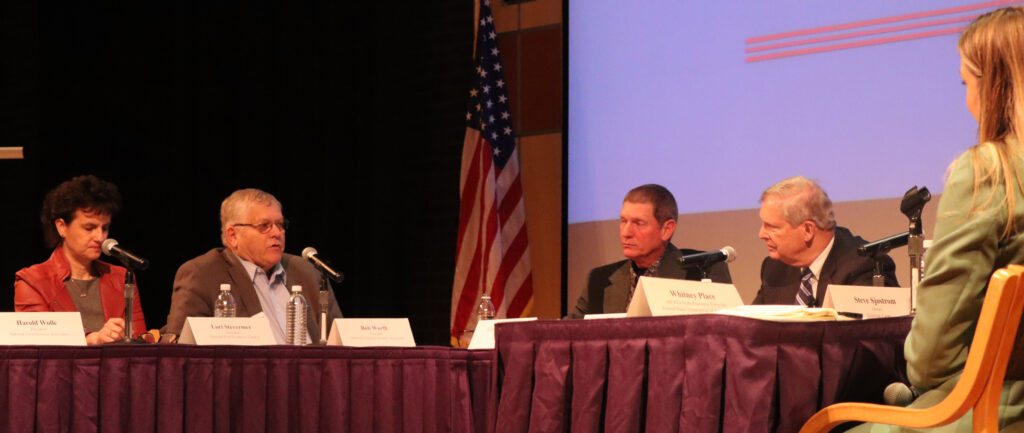The format was virtual this year, but directors with the Minnesota Soybean Growers Association arrived from remote locations throughout the state to participate in this year’s Hill Visits with state lawmakers. What a difference a year makes: On March 11, 2020, MSGA became the final advocacy group to meet in-person with most legislators before COVID-19 safety restrictions went into effect.
“Our Hill Visits allow our farmer-leaders to connect directly with legislators, and that’s more important than ever this year,” MSGA Executive Director Joe Smentek said.
The virtual format, though not ideal, held a silver lining. MSGA directors connected with more legislators – nearly 40 in total – than they normally would if the meetings had been held in-person.
“Anytime you can make a personal connection, the better off we are,” MSGA Director Andy Pulk said.
The multi-day Hill Visit began Monday morning with a meeting with Rep. Glenn Gruenhagen (R-Glencoe). Farmer leaders, including MSGA Directors Bob Lindeman and Ryan Mackenthun, thanked Gruenhagen for supporting full Section 179 conformity, which passed last year and will bring more than $100 million tax relief to rural Minnesotans. Gruenhagen also spoke of his support for the next generation of growers.
“We need young farmers,” he said.
During Wednesday’s meeting, MSGA President Jamie Beyer also expressed her appreciation to House Speaker Melissa Hortman (DFL-Brooklyn Park) for helping to pass full Section 179 conformity.
“Your leadership helped make this reality,” she said.

Rep. Rod Hamilton (R-Mountain Lake) echoed the bipartisan view of legislators when he signaled his support for rural broadband expansion in Greater Minnesota.
“I see a definite need for more rural broadband,” he said. “We need to do this.”
Brad Hovel, an MSGA director and farmer from Cannon Falls, thanked legislators for sensing the urgency in providing relief to farmers, livestock producers and processing plants during the first weeks of the COVID-19 crisis in spring 2020.
“The state allowed us the flexibility to keep maneuvering,” Hovel told Sen. Julie Rosen (R-Fairmont). “That really helped us weather the early stages of COVID, and we really appreciate that.”
The GOP caucus was unanimous in its opposition to Gov. Walz’s proposed Clean Cars Rule. Republican leaders say the debate on electric vehicles should take place in the legislature, not through the rulemaking process.
“We should be doing this in the legislature,” Rep. Hamilton said. “Sometimes ag is an easy target, and that’s what I see here.”
MSGA has also pushed back against the proposal, asserting that biodiesel already helps reduce greenhouse gas emissions, equating to the removal of 245,000 cars from Minnesota roads each year. As currently written, MSGA believes the Clean Cars initiative would leave farmers and agribusiness in regulatory limbo, stunt the environmental progress Minnesota has already made and increase the cost of vehicles for rural residents
“We’re bullish on biodiesel,” MSGA Director Chris Hill, who also sits on the National Biodiesel Foundation board, told Rep. Peggy Bennett (R-Albert Lea). “It’s a clean fuel and we want to continue to be the leader. Biodiesel is the answer.”
Sen. Nick Frentz (DFL-Mankato) said he supports the Clean Cars Rule, but more needs to be done to address environmental concerns.
“Biodiesel has been a huge success and is reducing carbon emissions,” he said. “However, that reduction isn’t making a difference.”
MSGA directors also advocated for increased rural mental health resources. Kelli Sorenson, the newest member of the American Soybean Association’s Young Leader program, sees an urgent need for more rural mental health awareness as part of her job working in ag finance.
“We want to remove the mental health stigma,” said Sorenson, who farms in Redwood County. “It’s an important topic.”
With the Ag Innovation Campus in Crookston set to begin construction later this year, MSGA directors thanked lawmakers for their support of the project.
“We’re so appreciative of the $5 million the state approved toward the Ag Innovation Campus,” MSGA Vice President Mike Skaug said. “The process is coming along great, and we’ve been working diligently.”
Sen. Kent Eken (DFL-Twin-Valley) said he foresees the Ag Innovation Campus being an economic generator for his district in northwest Minnesota.
“I think it’s a great boon for our area,” said Sen. Eken, the Senate’s minority whip. “You’re doing great work, and we want to create jobs here.”
The Hill Visits also afforded MSGA leaders to meet with freshman legislators like Bjorn Olson (R-Elmore) a farmer and teacher from Martin County. Olson said he wants to be a champion for farmers.
“I want to be the ‘ag guy’ in St. Paul,” Olson said.
The Hill Visits concluded Friday, when MSGA leaders met with Minnesota Department of Agriculture Commissioner Thom Petersen to review the organization’s core priorities. The commissioner complimented MSGA for advocating for continued funding for the Northern Crops Institute, which is now included in the governor’s biennial budget.
“It really helped that MSGA spoke up in favor of NCI,” Commissioner Petersen said. “Take credit for that.”




